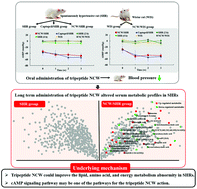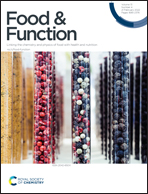Antihypertensive effect and underlying mechanism of tripeptide NCW on spontaneously hypertensive rats using metabolomics analysis†
Abstract
Tripeptide NCW identified in our previous study displayed a strong ACE inhibitory activity, but whether it has any antihypertensive effect in vivo remains unknown. Thus, in this study, we aimed to investigate the protective effects of tripeptide NCW in spontaneously hypertensive rats (SHRs) and to further figure out the serum metabolic profiling variations due to its oral administration via UPLC-Q-TOF-MS/MS-based metabolomics analysis to clarify the underlying hypotensive mechanism. After three weeks of oral administration, the tripeptide NCW-treated group (NCW/SHR group, 80 mg per kg BW per d) showed significantly reduced systolic and diastolic blood pressure by 48.08 ± 3.84 mmHg and 48.92 ± 5.77 mmHg, respectively. Additionally, a total of 25 blood pressure–related metabolites were identified as being significantly changed in SHRs given tripeptide NCW after three weeks. These 25 metabolites might be biomarkers that indicated that the tripeptide NCW exhibits antihypertensive activity via regulating bile acid metabolism, lipid metabolism, amino acid metabolism, purinergic signaling, pantothenate and CoA biosynthesis, and the citrate cycle. Collectively, tripeptide NCW has a protective effect on SHRs associated with serum metabolite abnormalities.



 Please wait while we load your content...
Please wait while we load your content...